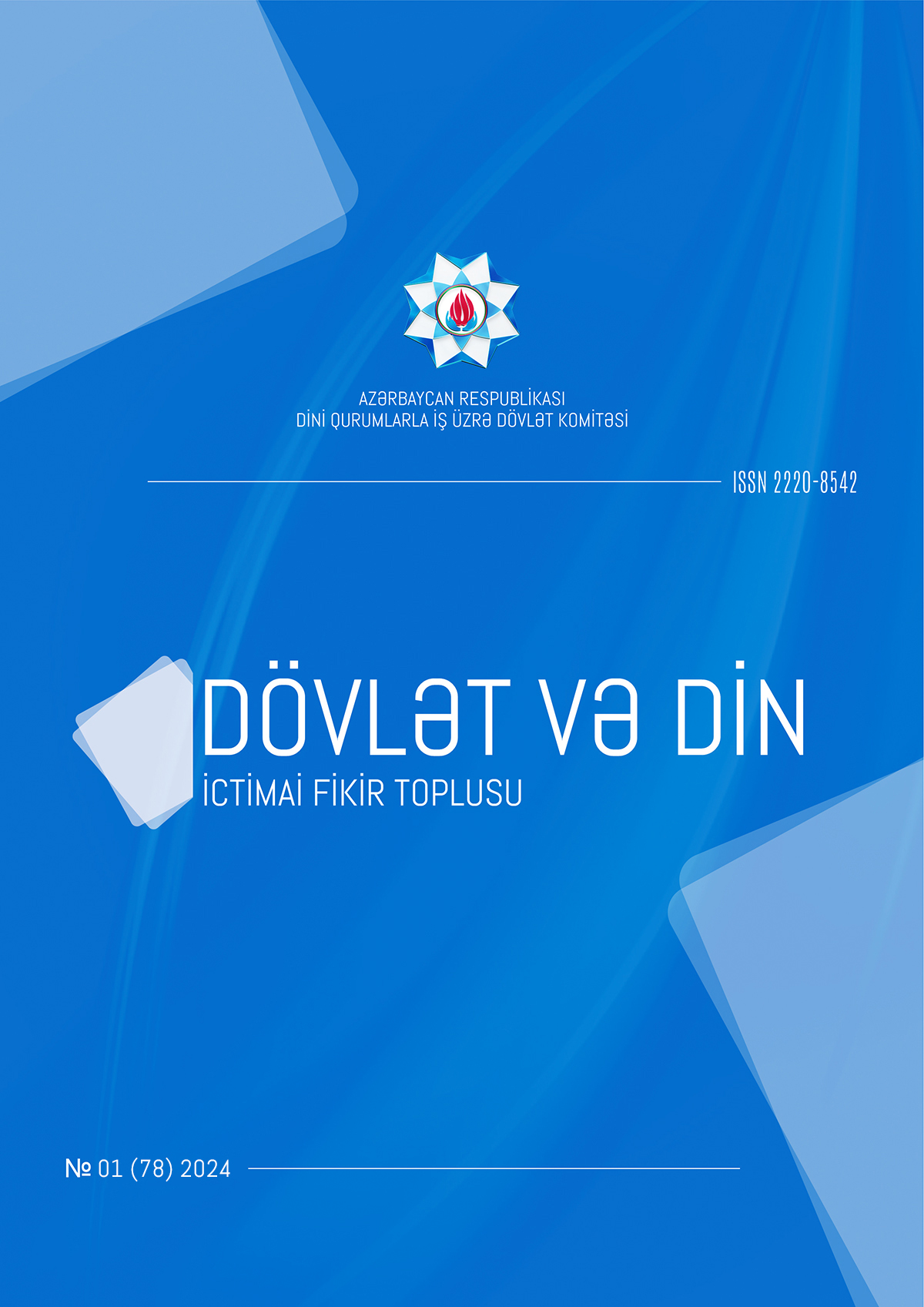TOLERANTLIQ VƏ DÖZÜMSÜZLÜK: CƏMİYYƏTDƏ TOLERANTLIĞIN ROLU
Səfər Səfərli | s_seferli@list.ru
Dini Qurumlarla İş üzrə Dövlət Komitəsinin Xarici əlaqələr şöbəsinin məsləhətçisiBirgəyaşayış mədəniyyəti
XÜLASƏ
1. Aslanova R. Qloballaşma və mədəni müxtəliflik. Bakı: Elm, 2004, 264 səh.
2. Aslan Ömer. Hoşgörü ve tolerans kavramlarına etimolojik açıdan analitik bir yaklaşım / http://www.cumhuriyet.edu.tr/edergi/makale/325.pdf (10.01.2008).
3. Barber B. Fear’s Empire: War terrorism and democracy. New York: Norton, (2003).
4. Council of Europe. Living Together As Equals in Dignity. Strasbourg: 7 May 2008 / https:// www.coe.int/t/dg4/intercultural/source/white%20paper_final_revised_en.pdf?fbclid=iwar1 5lzoofzqr5hwosnbwdpxnn6wcbczivzh4-akbtxztcqnrv80kqwxi2-8
5. Forst R. To tolerate Means to Insult. Toleration, Recognition, and Emancipation, in Recognition and Power: Axel Honneth and the Tradition of Critical Social Theory, B. Van den Brink and D. Owen (eds.) Cambridge: Cambridge University Press, pp. 215-237, 2007.
6. Dr. Ambrosewicz J. Towards a culture of tolerance and peace. 2003 / https://www.ibcr.org/ wp-content/uploads/2016/06/Towards-a-culture-of-tolerance-and-peace-1.pdf?fbclid=IwA R20cjrmDFsKt__0eCzf2iXuSnrJ5wErj5FaSEK7EHDjbxXRKWG2t-Hoh6I
7. Джерелиевская М.А. Установки коммуникативного поведения. М.: Смысл, 2000.
8. Лузаков А.А., Сухих Е.С. Стиль оценивания как фактор толерантности личности // Личность и бытие: личность и социальная реальность: Матер. Всерос. науч.-практ. конф. Краснодар: Кубан. гос. ун-т, 2003.
9. Həsən M. Dialoq mədəniyyəti və metodologiyası. Bakı: 2011.
10. Əhədova Sevda. Müasir dünyada mədəniyyətlərarası münasibətlər. Bakı: Elm, 2014, 348 səh.
11. Yürüşen Melih. Liberal bir değer olarak ahlaki ve siyasi hoşgörü. İstanbul: Yapı Kredi Yayınları, 1996.
12. Altemeyer B. The other - authoritarian personality / Advances in Experimental Social Psychology, 30: 47-92, 1998.
13. Altemeyer R.A. The authoritarian specter. Cambridge, MA: Harvard University, 1996.
14. Batson C.D., Naifeh. J.S. and Pate S. Social desirability, religious orientation, and racial prejudice // Journal for the Scientific Study of Religion, 17: 31-41, 1978.
15. Bobo Lawrence and Frederick C. Licari. Education and political tolerance: testing the effects of cognitive sophistication and target group affect // The Public Opinion Quarterly, 53: 285-308, 1989.
16. Fotion N. and Elfstrom G. Toleration. Tuscaloosa: University of Alabama Press, 1992.
17. Gibson J.L. The political consequences of intolerance: Cultural conformity and political freedom // American Political Science Review 86(2): 338–56, 1992.
18. Raphael D.D. The Intolerable, in Justifying Toleration, S. Mendus (ed.). Cambridge: Cambridge University Press, pp. 137-153, 1988.
19. Ratzmann. N. Intercultural dialogue: a review of conceptual and empirical issues relating to social transformation. 2019 / https://www.annalindhfoundation.org/sites/default/ files/2020-03/intercultural%20dialogue%20a%20review%20of%20conceptual%20 and%20empirical%20issues%20relating%20to%20social%20transformation. pdf?fbclid=iwar30hrpe1mkkzsidkaloxwmuffdvx6mxetyf49mqqsxjlqg1rczph77lsle
20. Saillant F. Diversity, dialogue and sharing. UNESCO, 2017 / https://en.unesco.org/ interculturaldialogue/sites/default/files/inline-files/EN_Diversity_Dialogue_and_Sharing. fbclid=IwAR3SJ8cIgyML9loMasLe7v2llfbktUKWvhIUeo2k4ZfnGsOvLICbWSpZCB8
21. Гриншпун И.Б. Понятие и содержательные характеристики толерантности (к вопросу о толерантности как психическом явлении) // Толерантное сознание и формирование толерантных отношений (теория и практика). М.: МПСИ; Воронеж: НПО «Модек», 2003.
TOLERANCE AND INTOLERANCE: THE ROLE OF TOLERANCE IN SOCIETY
Safar Safarli | s_seferli@list.ru
Dini Qurumlarla İş üzrə Dövlət Komitəsinin Xarici əlaqələr şöbəsinin məsləhətçisiCoexistence culture
SUMMARY
This article discusses features and importance of tolerance, as well as the characteristics, consequences, indicators of intolerance, the fight against intolerance, the role of intolerance in conflicts in society and the role of tolerance in conflict resolution. Creating intercultural and interreligious dialogue is an indispensable way to resolve conflicts. In this regard, societies should first adopt the principles of tolerance, and then it might be possible to implement it at the global level. According to some researchers, a tolerant society is one in which the majorities and the minorities have equal opportunities and rights. In fact, we can agree with that. It is not the concept of tolerance that an equal number of people compromise with each other or minorities obey the majority. Tolerance must be voluntary and, in essence, serve to peace. In short, the concepts of «foreigners» and «others» are out of the concept of tolerance. The article provides information on these and other relevant issues
ТЕРПИМОСТЬ И НЕТЕРПИМОСТЬ: РОЛЬ ТЕРПИМОСТИ В ОБЩЕСТВЕ
Сафар Сафарли | s_seferli@list.ru
Dini Qurumlarla İş üzrə Dövlət Komitəsinin Xarici əlaqələr şöbəsinin məsləhətçisiКультура сосуществования
РЕЗЮМЕ
В данной статье рассматриваются характеристики и показатели толерантности, важность толерантности, показатели нетерпимости, борьбы с нетерпимостью, роль нетерпимости в конфликтах в обществе, а также роль толерантности в разрешении конфликтов. Создание межкультурного и межрелигиозного диалога - незаменимый способ разрешения конфликтов. В этом отношении общества должны сначала принять принципы толерантности, а затем станет возможным внедрить их на глобальном уровне. По мнению некоторых исследователей, толерантное общество - это такое общество, в котором большинство и меньшинство имеют равные возможности и права. Фактически, мы можем согласиться с этим. Концепция толерантности не состоит в том, что равное количество людей идет на компромисс друг с другом или меньшинства подчиняются большинству. Терпимость должна быть добровольной и, по сути, служить миру. Короче говоря, понятия «иностранцы» и «другие» выходят за рамки понятия толерантности. В статье представлена информация по этим и другим актуальным вопросам




